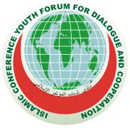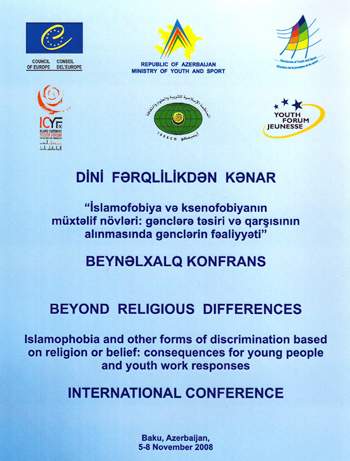|
Scope and concept
The phenomenon
described by the term “Islamophobia” is more than a simple – almost “innocent”
(as some might wish to portray it) – “fear of Islam;” in many of its aspects and
in various social and political constellations, it is actually anti-Islamism
what we are confronted with. As a specific form of social intolerance, it can
structurally be compared to other forms of xenophobia and outright racism,
including anti-Semitism.
As irrational
fear and rejection of “the other,” Islamophobia is more than just an expression
of religious intolerance or ideological dogmatism vis-à-vis another world view
and value system. As explicit negation of the equal rights of Muslims to express
their religious and social identity, Islamophobia is intrinsically evil and in
total contradiction to human dignity. Furthermore, in contemporary Europe,
Islamophobia has become a channel to express traditional anti-Arab and
anti-Turkish sentiments. The spread of Islamophobia worldwide – and in the West
in particular – gives rise to questions about the universal enforcement of human
rights and, subsequently, the credibility of governments and international
organizations in the pursuit of this task.
Islamophobia as
political factor: the state of affairs at the beginning of the 21st
century
Recent
developments have made obvious the enormous challenges posed by the spread of
Islamophobia to societies that tend to perceive themselves as democratic and as
committed to the basic standards of human rights:
–
In the
Western world, Islamophobia has gone far beyond its “traditional domain,” namely
the sentiments related to
Europe’s
confrontation with the Muslim world several centuries ago and, more recently,
the emotions stirred up as a result of the Arab-Israeli conflict.
–
As
expression of an outright anti-Islamist agenda, Islamophobia has entered the
political and social mainstream. Political parties are stirring up and using
Islamophobic sentiments for electoral gain. Islamophobia has indeed become part
of the “political game” as the success of parties with an outright anti-Muslim
agenda has repeatedly demonstrated, most recently in
Austria. This is
further illustrated by the fanatic campaigns that have recently been conducted
by certain political parties and civil society groups against the building of
mosques – indeed against anything that is considered to be a symbol of Islam or
expression of Muslim identity.
–
For
that reason, Islamophobia cannot anymore be dismissed as merely a phenomenon of
fringe groups or the far right. Islamophobic positions are also adopted by some
“liberal” ideologues and intellectuals and, through them, have entered the mass
media and made, in the view of many, the hatred and rejection of Islam socially
acceptable – or “politically correct.”
–
The
events of the year 2001 in the
United States
have triggered a new wave of Islamophobic sentiments that in turn have been
instrumentalized for wars against Muslim countries – a confrontation that has
even further alienated those countries from the West and aggravated anti-Islamic
stereotypes.
–
In
spite of well-intentioned campaigns by some governments and groups of civil
society, the increase of the Muslim population in
Europe has been
accompanied by an increase not only of anti-Islamic sentiments, but of violence
against Muslims and Muslim institutions. Because of the ever more hostile
“denial of reality” and rejection of Muslim rights by influential political
groups, the demographic aspect raises questions as to the internal stability of
Europe’s multicultural societies in the medium and long term.
Quid nunc,
Europa?
Solemn
declarations in favour of dialogue and mutual respect will not be enough in a
situation which is characterized by a further alienation of the Western
mainstream from the Muslims living in their midst. Regrettable as this may be,
it is by now an established fact that important sectors of Western society have
fallen back into the world view of a much earlier era. When it comes to the
perception of Islam and how to relate to citizens with Islamic faith, the danger
of the West’s descending into a new dark age of irrationalism is only too real.
There exists indeed a real danger of both sides getting trapped in a vicious
cycle of mutual misunderstanding.
What is needed
is a new campaign of Enlightenment about non-Western civilizations, in
particular non-secular world views such as that of Islam. The basic
contradiction underlying Islamophobia is only too obvious in the context of
Europe’s modern “political correctness” that, to some extent, is the legacy of
the continent’s colonial past, characterized by ideological arrogance: the
rejection of Islam in the name of rationality (λόγος)
is, in many respects, intrinsically irrational – since it dogmatizes the
Western claim to “modernity” and denies that quality to any non-Western
civilization, first and foremost Islam, as if the West had the doctrinary and
definitional privilege in matters of rational thought. In many discourses,
secularism has indeed become a surrogate religion.
In view of this
ideological dimension of the problem, Europe is facing a major educational
challenge which has become even more serious due to the strong support,
witnessed in some countries, of young people for political parties with an
anti-Muslim agenda. (In last September’s parliamentary elections in Austria,
almost 50% of the youngest voters supported the two right-wing parties that had
gained notoriety, inter alia, with their incitement of xenophobic,
especially anti-Turkish and anti-Muslim, sentiments and with a campaign of
hatred juxtaposing Europe’s “Christian” values with the supposedly irrational
world view of Islam which was presented as being incompatible with Christian
“humanism.”) A special responsibility lies with the Christian churches to
contain the hatred that has been spread “in the name” of Christianity. Church
leaders must not allow the hijacking of their religion by extremist groups and
for shortsighted electoral advantage. Religious education in elementary as well
as secondary schools should pay special attention to this development. School
textbooks will have to be amended in many respects. Furthermore, political
education must sensitize the youth about the equal rights of all religious
communities and must address the issue of ideological extremism of political
parties that thrive on a xenophobic agenda.
Furthermore, all
available political and legal means will have to be used to stem the tide of
Islamophobia. Double standards in interpretation and legislation have to be
abolished; when the challenge is to oppose extremism and intolerance in all its
forms, Islamophobia must not be left out from legislative regulation. No freedom
of expression can be claimed for an ideology of hatred and incitement that
negates the very notions of religious freedom and equal rights, and undermines
the multicultural foundations of Europe and the West, thus jeopardizing the
stability of entire nations and endangering global peace. In view of the
demographic realities, Europe will not have a bright future – i. e. a peaceful
future – if it is not able to stem the tide of xenophobic, and in particular
Islamophobic, sentiments.
***** | 

